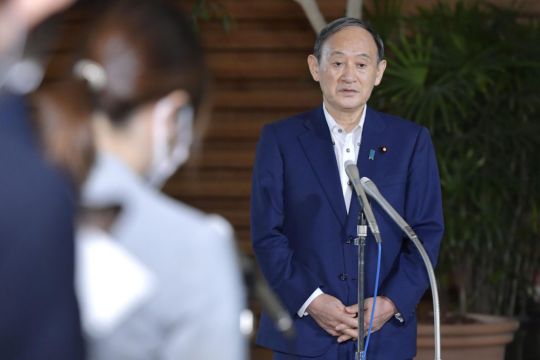A close ally of Japanese prime minister Yoshihide Suga was defeated in a high-profile mayoral election in Yokohama, Mr Suga’s home turf, in a sharp setback for the already unpopular leader ahead of general elections later this year.
Opposition-backed scientist Takeharu Yamanaka comfortably beat Mr Suga’s candidate Hachiro Okonogi in a field of eight with support from voters critical of the governing party’s pandemic response and its backing of plans for a waterfront casino in the city.
“The result was very unfortunate,” Mr Suga said on Monday.
“I understand it was the voters’ judgment over the pandemic and other issues in the city, and I take it humbly.”
Mr Okonogi’s defeat adds another election loss for Mr Suga, whose favoured candidates have been winless in local elections since he took office last September.
Sunday’s result is expected to further weaken his grip on power within the governing Liberal Democratic Party ahead of lower house elections that need to be held by November 28.

LDP candidates lost three parliamentary byelections earlier this year.
In the Tokyo metropolitan assembly election in July, the party failed to win back many of the seats it lost to Governor Yuriko Koike’s local party in the previous election.
LDP parliamentary affairs committee chief Hiroshi Moriyama said local elections won’t affect national election results, but opposition groups were emboldened by Sunday’s victory.
“We have demonstrated that opposition parties can achieve a landslide victory when we become one solid bloc,” said Jun Azumi, a senior lawmaker of the largest opposition group, the Constitutional Democratic Party of Japan.
Mr Yamanaka, 48, a former professor at Yokohama City University with no political experience, was backed by three liberal-leaning opposition parties: the Constitutional Democrats, the Japanese Communist Party and the Social Democratic Party.
Mr Yamanaka has analysed vaccine efficacy on coronavirus variants and is critical of Mr Suga’s lax virus measures.
He opposes the city’s divisive plan to build a casino on oceanfront property.

Mr Suga has faced criticism for insisting that the country go ahead with hosting the Tokyo Olympics and Paralympics despite strong public opposition due to concerns about the pandemic.
Recent media surveys show that his public support ratings have slid below 30% from around 70% soon after he took office.
Mr Suga became prime minister by replacing Shinzo Abe, who resigned because of health issues, promising to continue his policies while filling in as party leader until the end of his term in September.
Mr Suga has repeatedly said he plans to run for another term.
“I have said it is only natural to run when the time comes, and there is no change in that plan,” Mr Suga said.
Tokyo has been under emergency measures most of this year, most recently since July 12, but new daily cases have increased more than tenfold since then to about 5,000 in Tokyo and 25,000 nationwide, quickly filling up hospital beds and forcing many people, some requiring supplementary oxygen, to recover at home.







